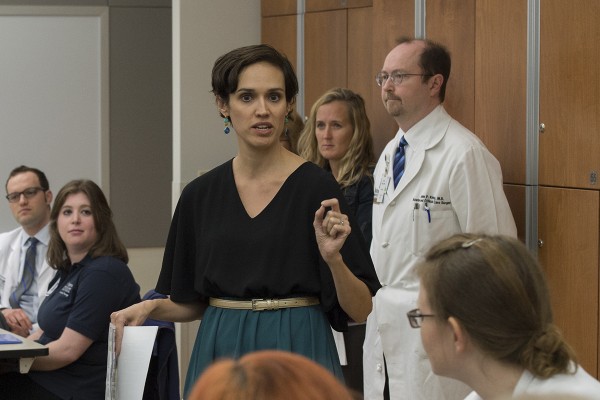New center aims to use immune system to fight cancer, other diseases
A new center at the School of Medicine will help scientists use the power of the immune system to fight infections and cancers. The Center for Human Immunology and Immunotherapy Programs is part of BioMed21, Washington University’s initiative to accelerate basic science discoveries into improved diagnosis and treatment for patients.
Gereau named Brown professor of anesthesiology
Robert W. Gereau IV, PhD, has been named the Dr. Seymour and Rose T. Brown Professor of Anesthesiology at the School of Medicine. He studies the molecular mechanisms involved in pain sensation, and his research includes optogenetics, which uses light signals to activate or deactivate nerve cells responsible for transmitting pain signals to the brain.
Construction of new medical records office begins in CAM lobby April 21
Construction of a new medical records customer-service office will begin the evening of Monday, April 21, in the Center for Advanced Medicine (CAM) lobby. The office — part of Barnes-Jewish Hospital — is relocating to CAM from the first floor of Shoenberg Pavilion as part of the Campus Renewal Project.
Study compares long-term effectiveness of diabetes drugs
Researchers at the School of Medicine are comparing the long-term benefits and risks of four widely used diabetes drugs given in combination with metformin, the most commonly prescribed medication for treating type 2 diabetes. The principal investigator at the St. Louis clinical site is Janet B. McGill, MD, who is pictured discussing options with study patient Michael Gingrich.
Medical Campus students perform ‘Young Frankenstein’ April 24-26
Students at the School of Medicine will perform “Young Frankenstein” April 24-26 in Whelpley Auditorium at the St. Louis College of Pharmacy, which abuts the Medical Campus. The performance is the school’s ninth annual completely student-run musical.
Danforth Fellowships in plant sciences announced
Chancellor Mark S. Wrighton has announced the creation of new four-year fellowships in the Division of Biology and Biomedical Sciences, made possible by a generous gift from William H. Danforth. Danforth hopes the new fellowships will attract highly motivated students to this field of study and foster a culture of intellectual entrepreneurship focused on research and innovation in plant sciences.
Tinianow to receive 2014 Stalker Award
Alex Tinianow will receive this year’s Harrison D.
Stalker Award from the Department of Biology in Arts & Sciences at
Washington University in St. Louis. The award is given annually to a graduating biology
major whose undergraduate career combines outstanding scientific
scholarship with significant contributions in the arts and humanities.
Some immune cells defend only one organ
School of Medicine scientists have uncovered a new way the immune system
may fight cancers and viral infections. The finding could aid efforts to
use immune cells to treat illness.
Children’s Discovery Institute awards $3.1 million in pediatric research grants
Scientists researching pediatric lung disease, childhood cancer, malaria and short bowel syndrome will share $3.1 million in new grants from the Children’s Discovery Institute (CDI). The grants, announced earlier this year, will fund 10 research initiatives at the School of Medicine and St. Louis Children’s Hospital.
Interprofessional education: Learning patient-centered care
Future medical professionals from various disciplines, together for the first time, learn to coordinate care and communicate.
Older Stories



